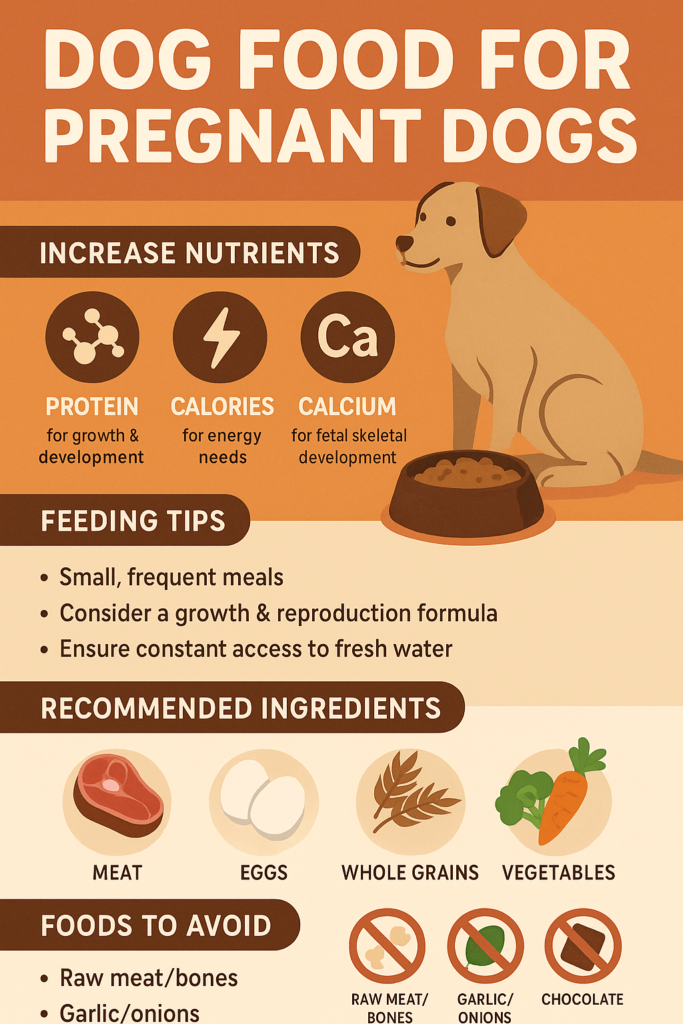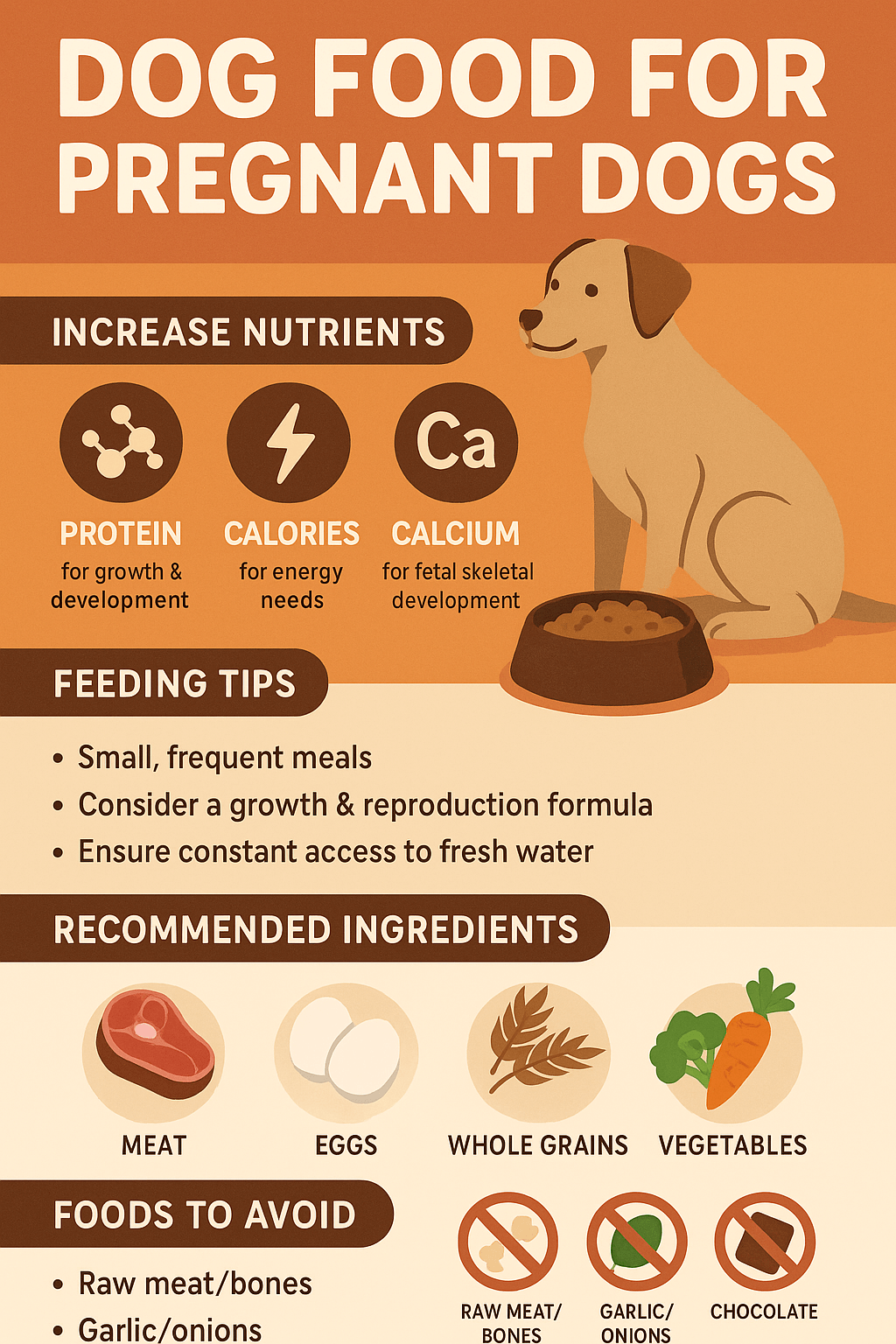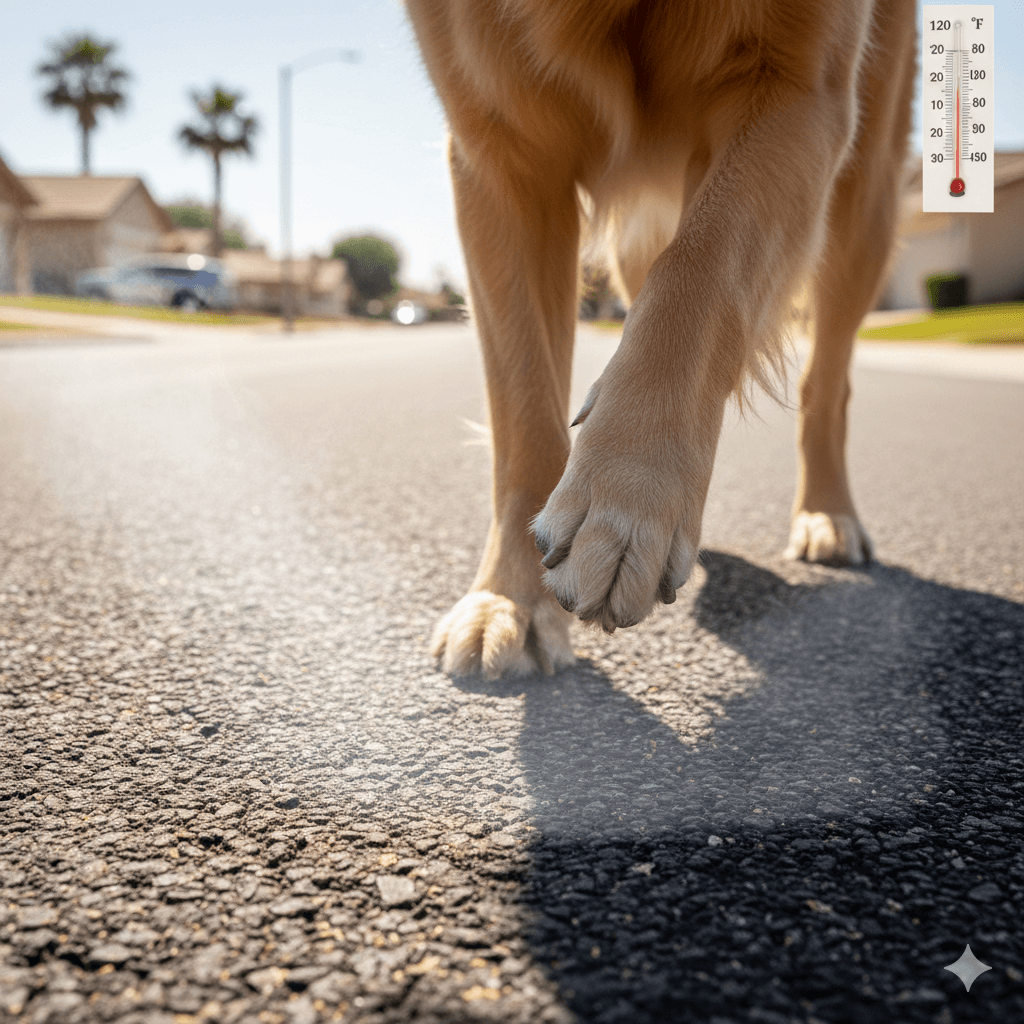Dog Food for Pregnant Dogs: Nourishing Your Expecting Pup
Welcoming a litter of puppies is an exciting time, but ensuring your pregnant dog receives the right nutrition is crucial for her health and the development of her growing pups. Just like humans, dogs have unique dietary needs during pregnancy, and providing high-quality food tailored to this stage can make all the difference. From essential nutrients to portion control, understanding what your pregnant dog needs will help you support her through this special time. Let’s explore everything you need to know about feeding your expecting canine companion.
Expert Insight: The Importance of Nutrition for Pregnant Dogs
“She needs food with higher calories and the right balance of minerals and vitamins, but there are so many types of dog food out there. Your expectant dog will need to be fed as usual until about day 40 of pregnancy when her calorie requirements go up and continue while she is suckling her pups.”
Key Nutrients for Pregnant Dogs
A pregnant dog’s diet must be rich in specific nutrients to support her changing body and the growing puppies inside her. Here are the most important components to look for in her food.
High-Quality Protein:
Protein is essential for muscle development and overall growth. Look for foods with real meat as the primary ingredient.Omega-3 Fatty Acids:
These healthy fats support brain and eye development in puppies while boosting the mother’s coat and skin health.Calcium and Phosphorus:
These minerals are vital for strong bone development in both the mother and her puppies. Ensure they’re balanced in her diet.Folic Acid:
This B vitamin helps prevent birth defects and supports fetal development during early pregnancy.Increased Calories:
A pregnant dog’s energy needs increase significantly, especially in the later stages of gestation. Choose calorie-dense foods to meet her demands.
Providing these key nutrients ensures your dog stays healthy and her puppies develop properly, setting the stage for a successful pregnancy.

Choosing the Right Dog Food for Pregnancy
Selecting the best food for your pregnant dog can feel overwhelming, but focusing on quality and nutritional value simplifies the process. Here are some tips to guide your choice.
Look for High-Quality Ingredients:
Avoid foods filled with artificial additives or fillers. Opt for brands that prioritize natural, whole-food ingredients.Check for AAFCO Certification:
The Association of American Feed Control Officials (AAFCO) certification ensures the food meets nutritional standards for all life stages.Consider Life Stage Formulas:
Foods labeled for “all life stages” or “puppy food” often contain higher nutrient levels suitable for pregnant dogs.Avoid Over-Supplementing:
While supplements can be helpful, overdoing them can harm your dog. Always consult your vet before adding anything extra.Monitor Portion Sizes:
Overfeeding can lead to excessive weight gain, which may complicate delivery. Follow feeding guidelines and adjust based on your vet’s advice.
By carefully selecting the right food, you can ensure your pregnant dog gets the nourishment she needs without unnecessary risks.
Check this guide 👉5 Best Gluten-Free Dog Foods for Ultimate Health Boost!
Check this guide 👉Top 5 Best Diabetic Dog Food Options for Ultimate Health!
Check this guide 👉Top 5 Best Turkey Dog Food Options for Ultimate Nutrition!
Nutritional Needs During Pregnancy | Foods to Avoid During Pregnancy |
|---|---|
High-quality protein sources | Low-protein or low-calorie diets |
Omega-3 fatty acids | Artificial preservatives |
Balanced calcium and phosphorus | Excessive grains or fillers |
Folic acid-rich foods | Raw or undercooked meats |
Calorie-dense formulas | Toxic foods like chocolate or onions |
Feeding Schedule for Pregnant Dogs
Establishing a proper feeding schedule is just as important as choosing the right food. Adjusting meal frequency and portions throughout pregnancy supports your dog’s changing needs.
Early Pregnancy (Weeks 1-4):
Maintain her regular diet and feeding routine during this stage, as her nutritional needs haven’t increased significantly yet.Mid-Pregnancy (Weeks 5-6):
Gradually increase her food intake by 10-20% to accommodate the growing puppies. Split meals into smaller, more frequent portions.Late Pregnancy (Weeks 7-9):
Increase her caloric intake by up to 50% and feed her multiple small meals daily to prevent discomfort from a full stomach.Postpartum Care:
After giving birth, continue feeding her nutrient-rich food in larger quantities to support milk production for nursing.Hydration is Key:
Ensure fresh water is always available, as dehydration can lead to complications during pregnancy and nursing.
Following this structured feeding schedule helps keep your pregnant dog comfortable and healthy throughout her journey.
Signs Your Pregnant Dog Isn’t Getting Enough Nutrition
If your pregnant dog isn’t receiving adequate nutrition, it can impact her health and the health of her puppies. Watch for these warning signs and address them promptly.
Weight Loss or Lack of Weight Gain:
Failure to gain weight despite increased food intake may indicate insufficient calories or nutrients.Lethargy or Weakness:
A lack of energy could signal malnutrition or an underlying health issue requiring veterinary attention.Poor Coat Condition:
Dull, dry fur or skin irritations may point to deficiencies in essential fatty acids or vitamins.Decreased Appetite:
If your dog refuses to eat, it could be due to stress, illness, or dissatisfaction with her food.Small or Underdeveloped Litter Size:
Insufficient nutrition can result in fewer or weaker puppies, highlighting the importance of a balanced diet.
Recognizing these signs early allows you to make necessary adjustments and ensure your dog thrives during pregnancy.
Common Mistakes to Avoid
Feeding a pregnant dog requires careful planning, but mistakes can happen. Avoiding these common errors ensures your dog stays healthy throughout her pregnancy.
Overfeeding Too Early:
Increasing food intake too soon can lead to unnecessary weight gain, which may cause complications later.Neglecting Hydration:
Dehydration can harm both the mother and her puppies, so always ensure access to fresh water.Switching Foods Abruptly:
Sudden changes in diet can upset your dog’s stomach. Transition gradually over 7-10 days.Ignoring Veterinary Advice:
Skipping regular check-ups or disregarding professional recommendations can jeopardize your dog’s health.Feeding Table Scraps:
Human food can be harmful or unbalanced, so stick to high-quality dog food designed for pregnancy.
Avoiding these mistakes keeps your dog’s pregnancy on track and minimizes potential risks.
Homemade Diet Options
Some owners prefer homemade diets for their pregnant dogs, but it’s essential to ensure they’re nutritionally complete. Here’s how to create a safe and balanced homemade meal plan.
Include Lean Proteins:
Cooked chicken, turkey, or beef provides essential amino acids for growth and development.Add Healthy Carbohydrates:
Incorporate cooked sweet potatoes, brown rice, or oats for energy and fiber.Supplement with Vegetables:
Leafy greens like spinach or carrots offer vitamins and minerals that support overall health.Incorporate Calcium Sources:
Crushed eggshells or calcium supplements (vet-approved) help meet calcium needs safely.Consult a Veterinarian:
Always have your homemade recipes reviewed by a vet to ensure they’re balanced and complete.
Homemade diets can work well if prepared thoughtfully and with professional guidance.
Preparing for Postpartum Nutrition
Once your dog gives birth, her nutritional needs shift again to support lactation and recovery. Here’s how to prepare for this next phase.
Increase Food Quantity:
Nursing mothers require twice as many calories as usual to produce enough milk for her puppies.Provide Frequent Meals:
Offer small, frequent meals throughout the day to keep her energy levels stable.Ensure Easy Access to Water:
Nursing increases water needs, so place multiple water bowls around the house for convenience.Monitor Her Weight:
Keep an eye on her body condition to ensure she’s not losing too much weight while nursing.Gradually Transition Back to Normal Food:
As her puppies wean, slowly reduce her food intake and transition back to her regular diet.
Planning ahead for postpartum care ensures your dog remains strong and healthy after delivering her litter.
Frequently Asked Questions About Feeding Pregnant Dogs
Can I feed my pregnant dog puppy food?
Yes, many puppy foods are nutrient-dense and suitable for pregnant dogs, especially during late pregnancy.
How much should I increase my dog’s food intake?
Increase her food gradually, aiming for a 25-50% increase by the end of pregnancy, depending on her size and breed.
Is it safe to give supplements?
Only give supplements if recommended by your veterinarian, as excessive amounts can harm your dog.
What should I do if my dog stops eating?
Contact your vet immediately, as loss of appetite can indicate health issues or complications.
Should I switch her food after giving birth?
Continue feeding her nutrient-rich food, as nursing requires even more energy than pregnancy.
Supporting Your Pregnant Dog Through Nutrition
Proper nutrition plays a pivotal role in ensuring a healthy pregnancy for your dog and the well-being of her puppies. By understanding her dietary needs, choosing the right food, and following a balanced feeding schedule, you can provide the care she deserves during this critical time. Remember, every dog is unique, so tailor your approach based on her individual requirements and consult your vet for personalized guidance. With the right preparation and attention to detail, you’ll set the foundation for a smooth pregnancy and a thriving litter of happy, healthy puppies.
Newfoundland Dog Personality: Best 7 Expert Tips! – Discover the gentle, loyal, and protective nature of this giant breed perfect for families.
Can Hot Pavement Burn Your Cats Paws? Best 7 Expert Tips! – Learn how to protect your cat’s paws from hot surfaces and prevent painful burns this summer.
Can Hot Pavement Burn Your Dogs Paws? Best 7 Expert Tips! – Learn how to protect your dog’s paws from hot surfaces and ensure safe summer walks.
Irish Wolfhound Size: Best 7 Expert Tips! – Discover the ideal height, weight, and care tips for this majestic giant breed. Learn how to manage their impressive stature responsibly.





